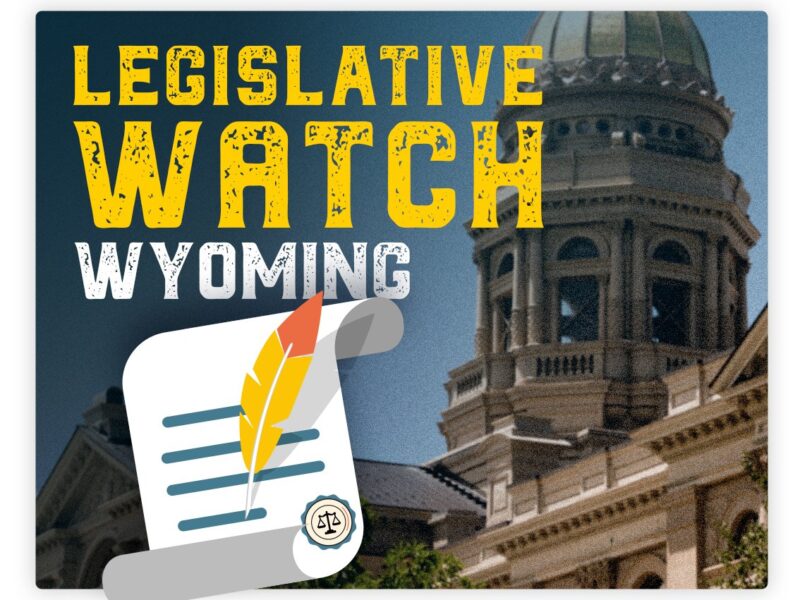LEGISLATIVE WATCH WYOMING: Medicaid Expansion a Delicate Balance of Pros and Cons (Part 2)
As far-right legislators point to culture war concerns, even some conservative Republicans believe it’s the “right thing to do for the people”
- Published In: Politics
- Last Updated: Jan 21, 2023

By Jacob Gardenwartz
Special to the Wyoming Truth
If Wyoming legislators vote to pass House Bill 80 and enact Medicaid expansion, Wyomingites could benefit in numerous ways: they’ll see greater access to health care coverage, a short-term budgetary bump and an influx of federal dollars for years to come.
But as was made clear in Thursday’s contentious House Revenue Committee hearing on the topic, the issue is far from cut and dry. Beyond the traditional conservative fears of government overreach and increasing entitlements, expanding Medicaid could pose unique challenges to hospitals and even some patients who stand to benefit from the policy.

And fears that Medicaid funds could be used to cover abortions or gender-confirmation services were brought up frequently by expansion opponents. Ultimately, lawmakers tacked on several amendments to prevent those procedures from being covered by Medicaid, though federal and state laws already prevent most of them from receiving funded.
The House on Friday took no action on Medicaid expansion. Though Revenue committee members sent the bill to the General File, it sits below a long list of other priorities. With the legislature now in recess through Tuesday, it’s unclear when lawmakers will next act on it — and if lawmakers in the full Wyoming House will give it their blessing.
Reimbursement rates and “crowd out” concerns
Among the biggest concerns for expansion opponents was Medicaid’s low reimbursement rate; on average, Medicaid insurance reimburses doctors and hospitals only 70% of what they’re paid by Medicare, which is even less than what most private insurers pay.
As such, increasing the number of patients covered by Medicaid could impact hospitals’ finances and force them to shift costs to other patients.
Dr. John Mansell, a Gillette doctor and representative for the Wyoming Anesthesiologist Association, argued such an expansion would drastically impact healthcare costs for other Wyomingites.
“The defining characteristic of Medicaid is it does not pay enough to cover the cost of the care,” Mansell said during Thursday’s hearing. “By expanding a program that takes money out of the system, you’re cannibalizing your own healthcare infrastructure in the state of Wyoming.”
Proponents concede that Medicaid reimbursement rates are lower than those of other insurers, but note that hospitals would rather be paid something than nothing — which is what currently happens when uninsured individuals require emergency services. Rep. Ed Buttrey, a Montana state representative central to the state’s successful push to expand Medicaid in 2015, said so-called “uncompensated care” rates dropped by over 50% after his state expanded Medicaid, resulting in $200 million in savings for hospitals.
Josh Hannes, vice president of the Wyoming Hospital Association, echoed those sentiments, arguing that shifting care from an emergency hospital setting to primary care environments is both cost-effective and good policy.
“When you provide coverage to people, they can access care in the right place at the right time,” Hannes said.
Also of concern were fears of the so-called “crowd out” phenomena. For Wyomingites living above the poverty line but below the 138% threshold, a shift to Medicaid would require switching insurance providers, as those individuals currently qualify for heavily-subsidized private insurance.

Such a switch wouldn’t substantially impact their finances — a difference between “heavily federally-funded Medicaid versus heavily federally-funded private insurance subsidies,” Wyoming Department of Health director Stefan Johansson explained. But it would no doubt cause logistical problems.
Conservative lawmakers raise abortion, transgender and budgetary concerns
For some lawmakers, the concern wasn’t only who Medicaid expansion would impact but also which treatments it would cover.
Chair of the Wyoming Freedom Caucus Rep. John Bear (R-Gillette) alleged, without evidence, that Medicaid expansion in other states has been used to finance abortions. However, federal law currently prevents federal dollars from being spent in such a manner.
Indeed, Johansson testified that “Wyoming Medicaid does not cover abortion services, and we don’t plan to.”
Still, committee chair Rep. Steve Harshman (R-Casper) proposed an amendment to the bill which would prevent Medicaid funds from being used for abortions. The measure was approved Thursday by a voice vote.
Bear also raised concerns that Medicaid funds could be used for gender confirmation procedures, surgeries or medical treatments intended to help those with clinically-diagnosed gender dysphoria alter their gender presentation. He proposed an amendment to prevent Medicaid funds from covering “chemical neutering or puberty blocking drugs or surgery for the treatment of gender dysphoria,” something which narrowly cleared the committee.
Of concern to some lawmakers and expansion opponents in the audience was the reliance on federal funds to finance expansion. Freshman Rep. Sarah Penn (R-Lander), who also works as a nurse practitioner, called expansion “a stage four terminal cancer” and highlighted the growing federal deficit.
“In no entity other than government will we consider going into a partnership with a business that is $32 billion in debt,” Penn said. “It’s not good business.”
But others sought to reframe that debate on moral terms, arguing the spending is warranted for the benefit of the common good.
“Not every government program is an inevitable, slippery slope into the fiery, fiery pit of socialism,” said Deacon Mike Leman, representing the Catholic Diocese of Cheyenne. “We need to recognize when our colleagues are manipulating our fear that that is the case.”
What happens next?
As it currently stands, HB80 if passed is set to expire once the increased federal benefits for newly-expanding states sunset after two years. If expansion is enacted and the expanded benefit ends, lawmakers would have to vote again to extend the policy or it would automatically be shut down.
To prepare for such an outcome, Bear proposed an amendment requiring $3 million in federal dollars to be reserved for the marketing of Medicaid’s cancellation should that take place, which lawmakers adopted.
Ultimately, Bear, Reps. Tony Locke (R-Casper) and Tomi Strock (R-Douglas) voted no on the bill, with the other six lawmakers on the committee supporting it. The bill now sits waiting in the General File to be heard by the Committee of the Whole on the House floor, where it must survive three readings before it can go to the Senate.
“I’ve voted against this probably 10 times. As the appropriations chair, I cast the deciding vote in the committee that killed it — in a year it probably would have passed,” Harshman said. “I’ve just learned so much and as I’ve learned more — it’s the right thing to do for the people.”













